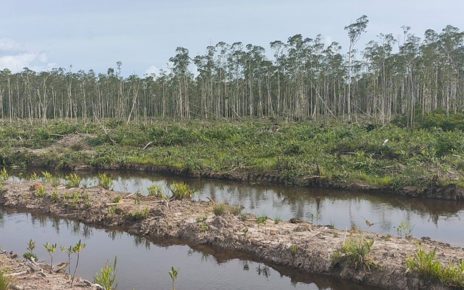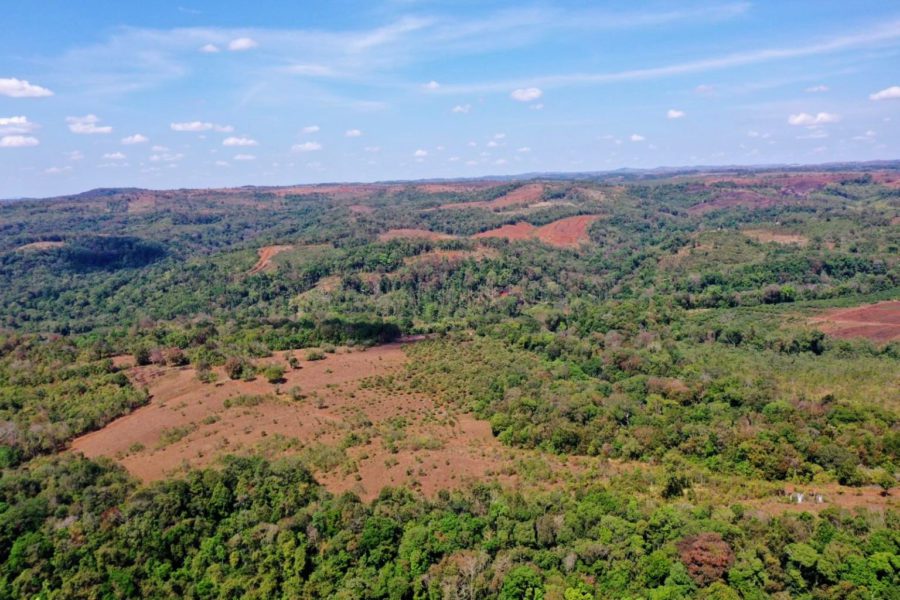Cambodia was among a minority of countries who did not sign a pledge to conserve and expand its forested ecosystems in the U.N. global climate talks last week despite forest loss being the country’s highest source of greenhouse gas emissions, which an activist called a sign of their lack of commitment to protecting dense forests.
The country was one of the 64 participants — making up a third of the 197 country signatories in the U.N.-led COP26 climate talks — that did not sign the Glasgow Leaders’ Declaration on Forests and Land Use, one of several pledges that countries promise to follow as part of their climate change mitigation and adaptation plans.
Though nonbinding, the declaration asks countries to respect the importance of forests for absorbing greenhouse gas emissions, as well as halt and reverse land conversion, which constitutes almost 50 percent of Cambodia’s emissions at 76.3 million tons of carbon dioxide equivalent annually.
Instead, Cambodia signed onto the Green Grids Initiative — promising to invest in and promote solar, wind, storage and other technology — and an education-related agreement, according to the U.K. ambassador, though the latter pledge hadn’t been posted on the conference’s website yet.
Environment Ministry spokesperson Neth Pheaktra said that Cambodia was committed to protecting natural resources even if Environment Minister Say Samal, who’s representing Cambodia in Glasgow, wouldn’t join other leaders in signing the declaration.
“Even when we’re not on the list of countries on the declaration, Cambodia commits to protect the natural resources and we continue to work on the participation for conservation, and we support the policy and also the declaration that we need to work together to protect the planet, so the commitment is the same,” he said.
But when asked why Samal would not sign on the list, the spokesperson said “I cannot tell you” and repeated that Cambodia’s commitment was the same before hanging up on a reporter.
U.K. ambassador Tina Redshaw, whose country is chairing COP26, called Cambodia’s decision “disappointing” but brought up other pledges that the country had signed onto, such as a commitment to develop solar power, which shows an interest in protecting resources.
“I think Cambodia has to choose what it’s got going on. It’s not going to sign onto every statement, but yes it’s disappointing that they haven’t signed onto that,” she said, referring to the leaders’ forest declaration.
In addition, Cambodia notably did not sign a commitment to transition away from coal toward green energy sources. Among Asean members, Singapore and Vietnam signed the agreement, while Indonesia and the Philippines endorsed three of four actions in the agreement, excluding a commitment to cease issuing permits for new coal-fired power plants.
In its pledge to contribute to climate change, Cambodia estimates that in 2030 it can reduce 42 percent of its emissions through offsetting, the majority of which would be offset through “reducing emissions from deforestation and forest degradation” projects, or REDD+, in which maintaining dense forests is critical.
But researchers and activists have raised consistent concern about systemic timber trade and land clearance throughout Cambodia’s protected areas, including active and planned REDD+ projects. Meanwhile, the government has sporadically banned community forest patrols and activists from Prey Lang Wildlife Sanctuary and other areas thought to be suffering significant forest loss.
When asked about Cambodia’s forest loss and in an interview about COP26 last week, U.K. ambassador Redshaw said she asked officials, including Environment Minister Say Samal, to address deforestation and stop banning activists from patrolling protected areas.
“We talk about the need for reforestation, not deforestation, and at the very least to stop the illegal logging,” she said. “It actually should be much more forward leaning than that and look towards ways to reforest.”
Redshaw noted that Cambodia had at least counted greenhouse gases from the forestry and land use sector in its latest survey of emissions, which it had not done in its 2016 count. She said this was a positive step because other developing countries had not included forest-related emissions in their own counts.
Heng Kimhong, head of research and advocacy for the Cambodian Youth Network, told VOD that the government has already struggled to hold its forest protection commitments, noting the government had promised to conserve 60 percent of forest cover, but an Environment Ministry report showed it had already fallen below 47 percent by 2018, in a report that included rubber and palm plantations as tree cover.

Based on analyses from satellites, Global Forest Watch estimates that only 40 percent of Cambodia was covered in forests in 2010, while Cambodia shed 1.81 million hectares of tree cover between 2010 and 2020, which would release an estimated 1.1 gigatonnes of emissions.
He also highlighted the persecution of environmental activists, noting that prominent figures documenting deforestation in Prey Lang Wildlife Sanctuary and members of advocacy group Mother Nature Cambodia had been detained if not charged for their activities.
“We know as well what was happening in the kingdom,” he said. “A lot of activists, a lot of local communities have been banned by the government. They cannot patrol, they cannot participate to protect the forests, so I think maybe the government doesn’t have enough commitment to protect the environment, so this is the reason Cambodia does not sign the paper,” he said, referring to the COP26 declaration on forests.
He added that he was concerned about the integrity of REDD+ projects in Cambodia and whether they would really absorb the country’s emissions in the future.
“They have no commitment and have a lot of corruption that happens in local [government], and it affects the situation,” he said. “This is the concern that the Cambodian government cannot protect forests for REDD+ projects.”
When speaking about Cambodia’s unfolding plans to onboard more coal-fired power plants, U.K. ambassador Redshaw said that it was not “in the interest” of COP26 participating countries to hold developing countries like Cambodia accountable for actively increasing their emissions. COP26 and other related U.N. climate talks, like the 2015 Paris Agreement to limit global warming to 1.5 degrees Celsius, are voluntary for all participating countries.
But Kimhong from CYN disagreed, saying this would be the next step for countries that already have a strong track record in emissions reduction in order to maintain the 1.5 degree rise limit, considered a critical milestone that the world is in serious jeopardy of exceeding.
“I think the leaders of Glasgow, they should ask the government to be accountable … about what next the Cambodian government should do to protect the environment and to protect it for the kingdom,” he said.













